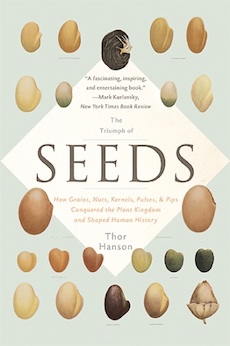Winner of the 2016 Phi Beta Kappa Award in Science
Indira Ganesan
Conservation biologist Thor Hanson begins his inquiry into the historical and social importance of seeds by listening to his toddler learning to speak. While cultivating a fascination with seeds, young Noah orders his world by categorizing everyday objects as those which have seeds and those which do not. Because, Hanson tells us, his son replaced his soft ‘s’ sounds with a hard ‘h’ making “seed” into “heed,” the author playfully discovers a topic to write about. Playfulness colors Seeds, as Thor presents his mad-scientist adventures of seed speculation. It is a fascinating and playful journey, making for a book that appeals to the general reader. As Hanson says, “Telling their story reminds us of our fundamental connections to nature—to plants, animals, soil, seasons, and process of evolution itself.”
Hanson begins by going back to his roots when he sampled and mapped a rainforest tree, an almendros, which produced a seed that he later discovers is nearly impossible to crack. His dissertation wasn’t about how seeds grew, but how the trees preserved themselves as the forest itself was drained. Now, he wants to know why we trust that a seed will grow on planting; dissection is a key, if a seed yields its shell. Once he breaks through, in the almendros’ case by a mallet and chisel, he is ready for more questions about seed development. Hanson tries a basic experiment of watching avocado pits grow in glasses of water. He recollects George Burns’ line in the movie Oh, God! is about regretting not making the avocado pit smaller, but knows that the seed is the perfect size for the plant in nature. Wanting to know exactly how a seed knows how to function, he finds one answer in an analogy given him by a fellow scientist, Carol Baskin, who describes a seed as a “baby plant, in a box, with its lunch.” Whether the seed then proceeds to eat it lunch and how much of it poses further questions of how seeds interact with their environment. From the avocado growing his garden shed, we travel with Hanson as he discovers just what makes seeds tick.
Gardeners will recognize bits of lore as the author’s wife advises her husband to plant his peas by President’s Day, as he tries to recreate a bit of Gregor Mendel’s experiments in plant hybridation. Doing so, he discovers the peace of the garden, “on cool spring mornings, surrounded by birdsong and blossoms.” He uses Almond Joys to discuss how adding nuts to a functioning product can produce a different result, then goes on to dissect the candy bar: the coconut, the corn syrup, the guar gum.
Seeds are found everywhere, and in practically everything we consume, but while Mendel’s experiments with peas and heredity can be reproduced in the backyard, journeys are required to scout out the oldest living trees, and understanding how seeds can, in some cases, survive thousands of years. Forty years after date palm seeds dating from 72 AD are found on Masada, Hanson reports that a curious scientist casually planted one, and found to her joy that it sprouted. Riffs on Columbus’ plant collections are followed by discussions of Darwin’s discoveries on the Galapagos. Other chapters in the book include a fascinating detective story to find out the cause of a famous James Bond like assassination of a spy with a poisoned pen, and the “cheeriest bean,” coffee. We end where we began with Noah and the author, launching a cucumber seedling shaped like a maple seed propeller, but the size of a handbreadth, into the air: both an experiment of seed dispersal, and for the sheer joy of watching an object soar and spin in the wind. Science is nothing if not rooted in a spirit of thrilling discovery and play, as Seeds amply demonstrates.
Novelist Indira Ganesan was inducted into Phi Beta Kappa at Vassar College in 1982. Her books include The Journey (Alfred A. Knopf, 1990), Inheritance (Alfred A. Knopf, 1998) and As Sweet As Honey (Alfred A. Knopf, 2013).




